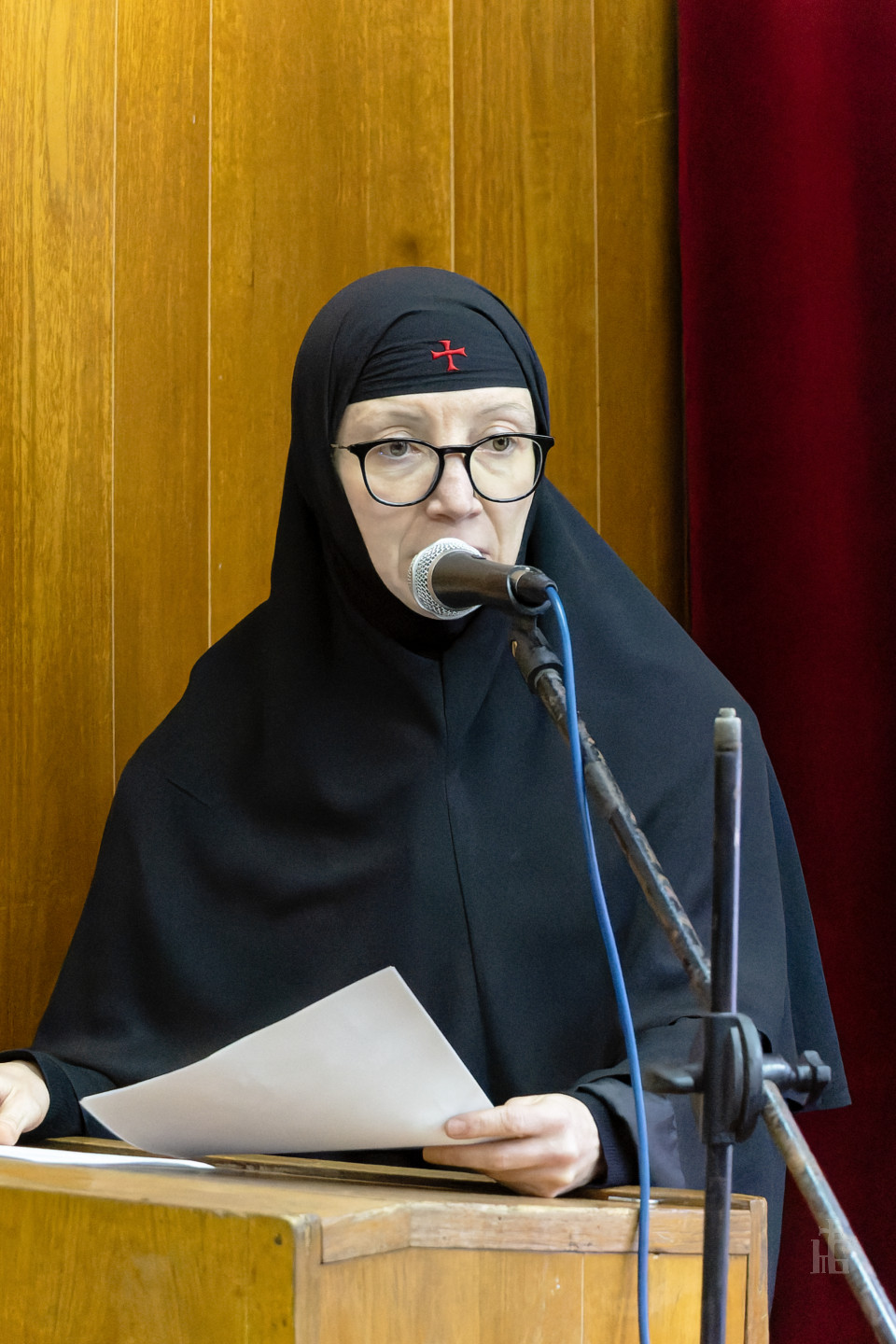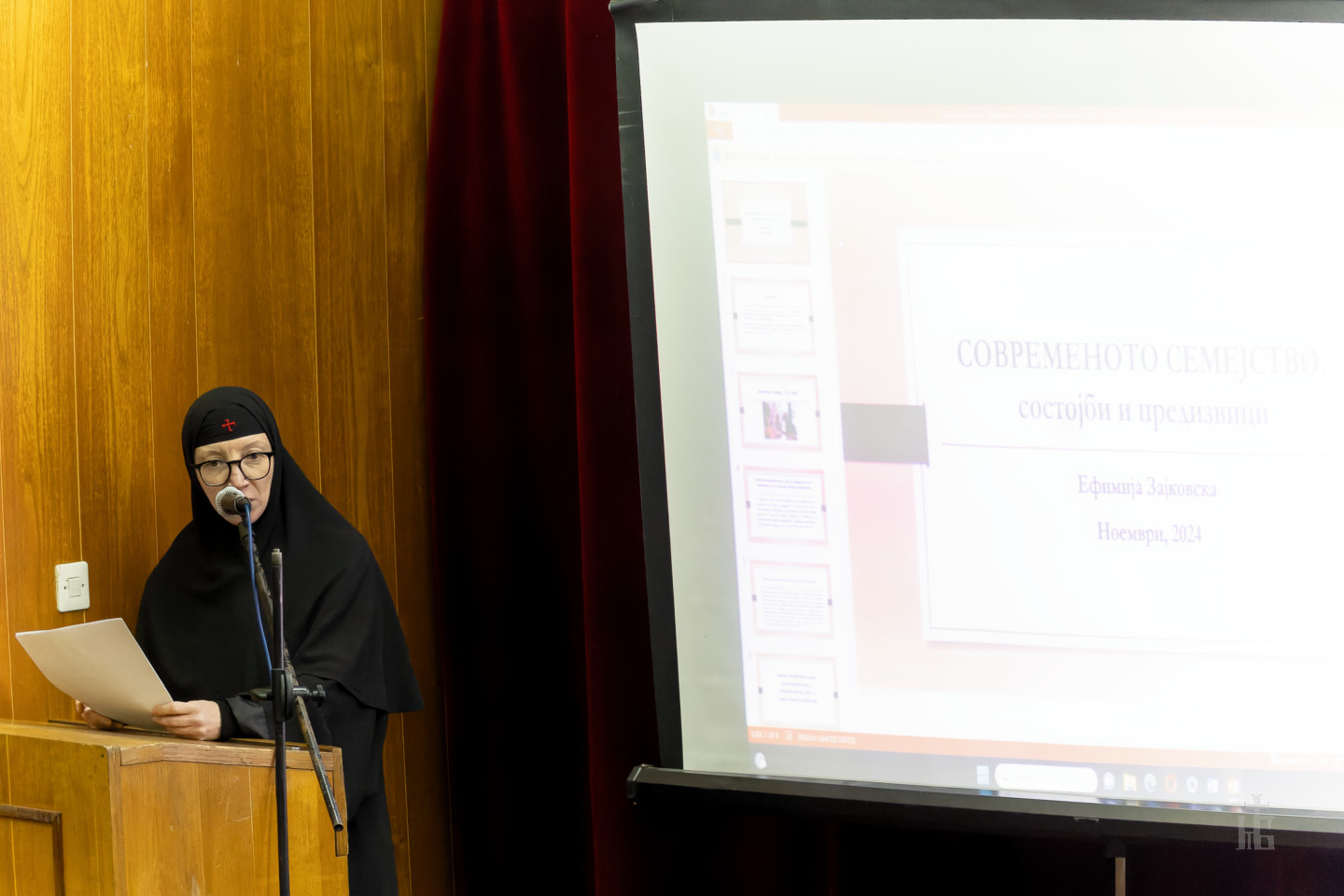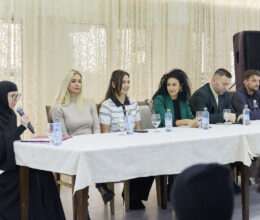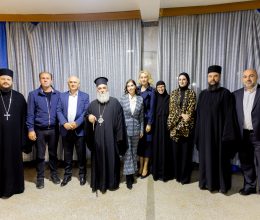Address by Nun Efimiya Zajkovska at the first interfaith forum in Debar on the theme: “The Family: Pillar of Love and Social Development,” held on November 9, 2024, the Year of the Savior
Honorable Mayor, Mr. Hekuran Duka,
Honorable Bishop Parthenius of Antania, Abbot of the Holy Bigorski Monastery,
Honorable Mufti, Mr. Reshat Kachalniku,
Honorable Director of the Debar Cultural Center, Ms. Edona Alili,
Revered Archimandrites, Hieromonks, Hierodeacons, Monks, and Nuns,
Distinguished Educational and Cultural Workers,
Esteemed Colleagues,
And all Honored Guests Present,
Last year, with the blessing of Bishop Parthenius, a fellow sister from the monastery and I visited the honorable Mayor, Mr. Hekuran Duka, to discuss our ideas regarding the support of coexistence within the Municipality of Debar. I must take this opportunity, before all gathered here, to publicly commend his swift and effective commitment to the proposals we presented. One such initiative is the municipal support for this multicultural and interfaith project, which will include forums, the publication of a children’s book featuring creative works on the theme of The Meaning of Family by children from the region, and a joint holiday charity bazaar, which we hope will be set up in the city center during the New Year holidays.
From the outset, we want to express our immense gratitude, especially to Mr. Hekuran Duka, who knows how to recognize and support ideas that advance society. Equally, we extend our sincere thanks to our monastic communities, led by our beloved Bishop Parthenius; to the Debar Muftiate, led by the honorable Mufti Reshat Kachalniku; and to everyone who, in any way, has offered their support toward realizing this project.
In developing this project, we quickly realized that there are specific modern challenges we must address collectively. One of these challenges is the declining interest among young people in living within a traditional family structure and embracing the responsibilities of family life, leading to a widely recognized issue in modern societies—the so-called demographic crisis.

On one hand, we see that today’s societies are significantly developed. We are witnessing remarkable advancements in many fields. We can now boast strong industrial and technological development aimed at making life easier, advancements in medicine focused on safeguarding and enhancing human health, and open borders that allow for easier exchange of personal and professional experiences, intellectual growth, and the formation of lasting friendships, among other benefits.
However, despite all this, a paradox emerges, reflecting profound damage within the human psyche: instead of advancing, humanity is regressing, facing deep loneliness, stress, fear, ignorance, and illness. Perhaps the most detrimental effect of modern development has been the alienation between people, which signifies a departure from humanity’s intended purpose—living in community and communion with God.
To clarify this issue further, I would like to illustrate this paradox through a specific example, supported by an interesting study conducted about fifteen years ago in Japanese society. The Japanese noticed that their birthrate was declining drastically, so they began investigations to pinpoint the causes behind this negative trend. Experts focused on studying the lives of young Japanese people (up to age 30) and discovered that they were living isolated lives in small apartments and, being preoccupied solely with personal development and career growth, had little time to form strong bonds with others. In other words, they lacked friends or partners. Not only that, but these young people lacked even the basic social skills and emotions needed to initiate contact with other people, let alone an interest in communal life.
Now, let’s look at how Japanese experts responded to this problem and what measures they implemented to protect young people from this destructive trend, which deepens alienation and contributes to the drastic decline in birthrates. In cafés, where young people would go during their work breaks—alone, of course, since they preferred no company—a cat was provided for companionship! And why a cat? To ensure they had some form of interaction with a living creature.
And so, Japanese society “protected” its young people from alienation in this way. However, this solution did not lead to a rise in birthrates. On the contrary, it only reinforced the declining trend.
Why am I sharing this with you?
I believe we can all agree that this is a negative phenomenon affecting not only Japanese society but the entire world today. One of the reasons for this troubling trend is the abandonment of foundational values that are instilled within family life. The paradox is that today’s individual achieves continuous professional growth yet stagnates and falters in family life; they have numerous virtual friends, yet fail to form deep, physical, and emotional connections with anyone. People display incredible courage in tackling new, complex challenges, yet are seriously fearful of opening their hearts to let in those close to them.
The second aspect I would like to emphasize is the Christian perspective on this topic. In that regard, I will quote my Elder, Bishop Parthenius, who says, “The first thing established and sanctified by God as the holiest institution on this Earth, a piece of Heaven on Earth, is the family. The family is nothing less than a small church, a warm home, a community dedicated to nurturing and ennobling the human soul. It is, in fact, a workshop for forming healthy individuals. The family produces holiness, as a place where one learns sacrifice, selflessness, and self-forgetfulness for the sake of others. The family perfectly aligns with the purpose for which humankind was created.”
To this, I would add what is written in the Old Testament Scriptures, where it says that God blessed the first humans, telling them to multiply and fill the Earth. From this, we can logically conclude that the continuation of the human race and the filling of society with morally developed individuals is, ultimately, the most progressive measure for creating and sustaining healthy societies. Every family is a small society, and society, in turn, is one large family.

As I near the end of my address, I would like to pose a few questions, for that, after all, is the purpose of gatherings like this: to inspire questions among the audience.
- Do today’s families truly have the ability to resist modern trends, which prioritize individual development over connection with one’s neighbor?
Why do I ask this? If we examine contemporary definitions of the increasing number of alternative family structures—definitions that deviate significantly from the traditional understanding of family—it becomes clear that we are living in a time where the family unit is undergoing dissolution. I am deeply convinced that one of the reasons for declining birthrates is this trend of abandoning time-tested traditions and disregarding moral values. Fewer young people mean a diminished workforce. A wise figure of the previous century, St. Paisios the Athonite, put it well when he said, “When the family disappears, everything will disappear.”
Today, children are no longer raised in the close circle of family but are instead left to live spontaneously, incidentally, engaging not with their friends but with their smart devices. Our children, the fruits of spousal love and God’s gift, our priceless treasure and hope for a healthy and bright future, live in a world dominated by the pursuit of self-centered desires and material comfort, in an atmosphere where authority and respect for elders are dismissed. And what is the effect of all this? The few children we have in our societies are increasingly isolated, which in turn fosters serious psychological and emotional complexes and frustrations.
I have one more question to which I’ll attempt to offer an answer. On the one hand, we see a reality that may not seem very promising, but on the other hand, there is within us a strong desire for change. None of us wants to simply accept the situation as it is; each of us wishes to contribute to the development of society in terms of spiritual and moral growth of human beings.
- How, then, do we accomplish this, when all of it seems so difficult?
It is precisely within this modern setting in which we all live that we are tasked with offering our perspective, contributing to systemic change, striving for better education for our children, and remaining steadfast in upholding moral values. We change society by influencing it through our positive example, defending the values we learned from family life as long as we breathe: respect for every person, humility, honesty, hard work, sacrifice, goodness, kindness, compassion, forgiveness, and love! These family values must continually flow from our small family circles into the larger family of the world. If we hold them within us, we will share them with others. For everyone passes on what they have learned; each person gives from their heart what it contains.
I will conclude by sharing a message of hope, a wish expressed by a ten-year-old child from the region whom I know very well. During one of the lectures held in the region with the blessing of Bishop Parthenius, intended for both children and adults, I posed a question to the youngest attendees to spark their thinking. The question was, “If you had the chance to travel in a time machine, to which time would you want to go?” You can imagine the rich imagination of children as they share their thoughts—believe me, it is truly inspiring. Some would travel to the future, others to the Stone Age; some wanted to be present when Christ lived on Earth, while others admired heroes and idols and wished to join them in the same place and time. But this ten-year-old child, after thinking it over, said, “I’d like to go back to the period between 2018 and 2020.” Surprised, I asked, “Why that time in particular?” The child replied, “Because back then, my friends didn’t have phones.”
This child, my dear friends, is the fourth child of a blessed family living in the region. We can all agree that such children are a strong hope that society can indeed regain its moral footing, returning to a state of balance. But we must remain steadfast and not give up at the first barrier.
We have gathered here to raise questions that will challenge us to reflect together on our priorities, to offer possible solutions, and to express a shared concern, sending a powerful message of hope. From here in Debar, within this harmonious coexistence, the religious communities represented by the Bigorski and Rajchica monasteries and the Debar Muftiate, along with our civic organizations, will use the municipality-supported project for coexistence to send the message that only “the family can be the pillar of love and social development.”
Thank you for your attention!















